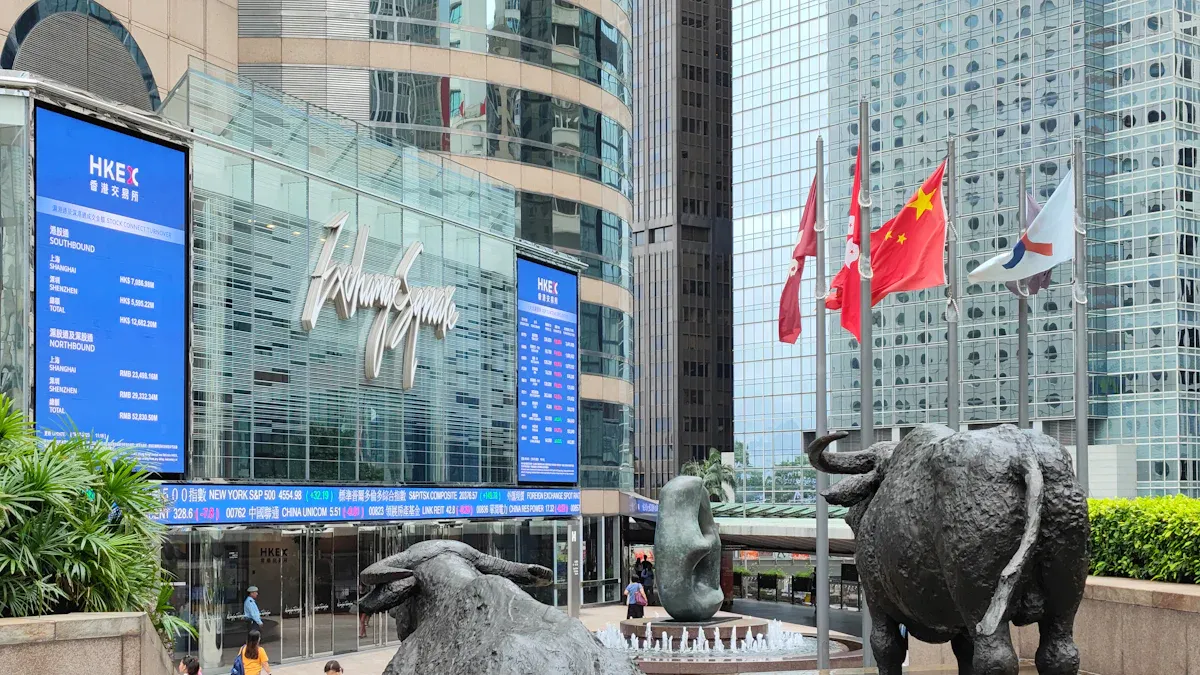- EasyCard
- Trade
- Help
- Announcement
- Academy
- SWIFT Code
- Iban Number
- Referral
- Customer Service
- Blog
- Creator
Common Misconceptions and Tips for Avoiding Pitfalls in Hong Kong Stock Investment: Essential Guide for Chinese Investors

Image Source: pexels
When investing in Hong Kong stocks, you might suffer losses due to blindly following trends or misunderstanding the impact of HIBOR changes on the market. Some investors believe that rising HIBOR inevitably tightens liquidity in Hong Kong stocks, leading to stock price declines, but the actual impact is often short-lived and indirect. Have you ever overlooked the effects of exchange rate fluctuations or market indicators? Understanding these misconceptions can help you mitigate risks and protect your capital.
Key Points
- Avoid blindly following trends in Hong Kong stock investment; focus on company fundamentals and valuations to avoid being misled by short-term market sentiment.
- Exchange rate fluctuations affect actual returns; assess exchange rate risks before investing and plan funding and conversion timing wisely.
- Hong Kong stocks differ from A-shares in trading rules; understand features like T+0 trading and no price limits to adjust your investment strategy.
- Choose a regulated broker for account opening to ensure capital safety and legal rights, avoiding legal risks from non-compliant operations.
- Adopt a long-term investment mindset, diversify risks, and continuously monitor company fundamentals and market changes to increase investment success.
Common Misconceptions in Hong Kong Stock Investment

Image Source: unsplash
Chasing Hot Trends
When investing in Hong Kong stocks, you might be drawn to market hotspots, blindly chasing popular stocks. Many investors see a stock surge in the short term and rush to buy at highs, ignoring fundamentals and valuations. For example, in 2017, Meitu and Zhou Hei Ya saw significant capital inflows after being included in Stock Connect, with intraday gains of 28.1% and 17.5%, respectively, but prices fell sharply by close, leaving many trend-chasing investors with losses. This shows that market sentiment and capital flows can cause sharp price swings, and blindly following trends often fails to deliver ideal returns.
Ignoring Exchange Rates
When investing in Hong Kong stocks, you often focus only on stock prices, overlooking the impact of exchange rate fluctuations on actual returns. Changes in the RMB-HKD exchange rate directly affect your investment returns.
- Exchange rate risk is a critical factor in Hong Kong stock investment, as RMB-HKD fluctuations directly impact returns.
- When HKD depreciates, returns calculated in RMB may decrease, adding investment uncertainty.
- Hong Kong’s market is highly volatile, and exchange rate risks amplify overall investment risk alongside market fluctuations.
- Investors should carefully consider exchange rate risks and develop strategies factoring in other risks.
For instance, if you buy Hong Kong stocks at a 1:0.85 exchange rate and the stock rises 20%, but the exchange rate shifts to 1:0.87 upon selling, your RMB-based returns may be offset by exchange rate losses. Even with stock price gains, adverse exchange rate changes can reduce actual returns or lead to losses.
Confusing A-Shares with Hong Kong Stocks
You might treat A-shares and Hong Kong stocks as similar markets, ignoring significant differences in trading rules and market structures.
| Dimension | A-Share Characteristics | Hong Kong Stock Characteristics |
|---|---|---|
| Trading Mechanism | T+1, can only sell the next trading day | T+0, can buy and sell on the same day, high flexibility |
| Price Limits | 10% for main board, 20% for STAR and GEM | No price limits, larger price fluctuations |
| Trading Hours | Monday–Friday, 9:30–11:30, 13:00–15:00 | Monday–Friday, 9:30–12:00, 13:00–16:00 |
| Currency | RMB | HKD |
| Investor Structure | Dominated by retail investors, heavily influenced by sentiment | Higher institutional investor presence, more internationalized |
| Listing Conditions | Strict, with high profitability and asset requirements | Diverse, emphasizing growth potential and inclusivity |
If you overlook these differences, you’re prone to mistakes in trading strategies and risk management. For example, during the 2010 rare earth frenzy, A-share rare earth stocks soared, and Hong Kong’s “China Rare Earth” was chased by capital, tripling in price short-term but later collapsing, causing losses for investors who misapplied A-share logic to Hong Kong.
Relying on News
You might base Hong Kong stock investment decisions on news, policies, or market rumors.
- Geopolitical conflicts trigger global market volatility, such as the Russia-Ukraine war causing an energy crisis, impacting Hong Kong stocks.
- Chinese concept stocks face US regulatory pressure, leading to capital outflows and stampede sell-offs in Hong Kong.
- Foreign investors reduce Hong Kong stock holdings due to global equity reallocations, exacerbating market declines.
- Internal factors like pandemics, industry regulations, and economic pressures also intensify market volatility.
- News and sentiment-driven trading significantly impact stock prices, potentially causing short-term volatility and increasing uncertainty and liquidity risks.
If you rely solely on news, you’re easily swayed by market sentiment, overlooking company fundamentals and long-term trends, leading to suboptimal investment outcomes.
Ignoring Taxes
When investing in Hong Kong stocks, you might overlook the importance of tax compliance. Hong Kong stock investments involve capital gains tax and dividend tax, with rates varying by investment channel.
| Tax Type | Investment Channel | Tax Rate Details |
|---|---|---|
| Capital Gains Tax | Stock Connect | Temporarily exempt from personal income tax on trading gains (policy valid until 2027), but income must be declared. |
| Dividend Tax | Stock Connect | Generally 20%, up to 28% for red-chip stocks (depending on outbound tax withholding). |
| Dividend Tax | Hong Kong Securities Account | Lower rates, typically 10% or less. |
| Dividend Tax | QDII Funds | Typically 10%, but dividends from some Stock Connect stocks are taxed at 20%. |
If you fail to declare overseas income as required, you may face late fees, tax audits, or public exposure. Tax authorities use CRS and international cooperation to enhance oversight, employing big data and AI for cross-verification, making tax evasion difficult. You need to understand tax policies, plan investment returns, and avoid legal liabilities due to tax oversight.
Underestimating Volatility
You might underestimate the volatility of the Hong Kong stock market. Hong Kong stocks have no price limits and follow a T+0 trading mechanism, resulting in greater price fluctuations.
- A-shares have price limits, while Hong Kong stocks allow free price movement.
- Hong Kong stocks can be bought and sold on the same day, making trading more flexible and volatile.
- Hong Kong stocks have flexible trading units, with some requiring only a few shares per lot, attracting short-term capital.
If you apply A-share thinking to Hong Kong stocks, you’re likely to be “shaken out” during sharp fluctuations or incur larger losses due to delayed stop-loss actions.
Focusing Only on Short-Term Gains
If you focus only on short-term performance, you’re likely to face losses in Hong Kong stock investments.
- Market sentiment fluctuations cause regret, leading to stop-loss sales or averaging down losses, trapping you in a vicious cycle of losses.
- Failing to set stop-loss strategies amplifies losses.
- Lack of diversification concentrates risk.
- Neglecting periodic portfolio reviews fails to adapt to market changes.
- Global economic conditions, exchange rates, and interest rate changes significantly impact Hong Kong stock volatility, and ignoring these factors leads to losses.
Long-term investing focusing on company fundamentals and industry trends offers lower risk and more stable returns. Short-term investing may yield high returns but carries extreme risks, easily leading to losses due to market volatility.
Choosing the Wrong Broker
When selecting a broker, you might focus only on low fees or ease of account opening, overlooking compliance and fund safety.
- Lack of fund safety guarantees: Unregulated by the China Securities Regulatory Commission, fund custody and transaction clearing lack effective oversight, risking fund freezes or misappropriation.
- Difficulty asserting investment rights: Offshore brokers are based overseas, making legal recourse complex and less successful, with limited legal protections.
- Risk of personal information leakage: Account opening requires sensitive data, which could be illegally collected and used for fraud or theft.
- Potential legal violations: Non-compliant account opening may breach forex, securities, and anti-money laundering regulations, exposing you to administrative or criminal risks.
- High fraud risk: Fake brokers posing as legitimate ones increase the likelihood of scams, with losses hard to recover.
You might mistakenly believe that brokers not recommending stocks in live streams aren’t providing advisory services, but advisory services include market analysis and sector recommendations, requiring proper qualifications. Choosing a regulated, compliant broker is essential for ensuring fund safety and legal rights.
Causes of Misconceptions
Information Asymmetry
When investing in Hong Kong stocks, you often face information asymmetry. Some Chinese companies listed in Hong Kong have untimely or opaque disclosures, making it hard for you to grasp their true operational status.
- Information asymmetry makes it difficult to accurately assess company fundamentals, leading to decisions swayed by market sentiment.
- You need solid knowledge, combining fundamental and technical analysis, to make informed investment decisions.
- You should also monitor macroeconomic factors to avoid missing opportunities due to delayed information.
Lack of Experience
If you’re new to the Hong Kong stock market, lack of experience makes you more prone to errors.
- Incomplete information access leads to delayed decisions.
- Emotional fluctuations affect your judgment, causing you to chase highs or sell in panic.
- Unfamiliarity with valuation methods, financial statement analysis, and trading rules hinders effective strategy development.
- Limited understanding of macroeconomic cycles and policy changes leads to poorly timed trades.
- During high market volatility, panic selling can cause losses.
It’s recommended to learn investment knowledge through multiple channels, control emotions, and strictly follow an investment plan.
Misunderstanding Rules
When investing in Hong Kong stocks, you often make mistakes due to unclear understanding of market rules.
- Many believe Hong Kong stock account opening requires $50,000 USD, but many Hong Kong brokers support low-threshold accounts.
- Hong Kong stocks allow odd-lot trading, enabling diversified investments with less capital.
- Hong Kong stocks use a T+2 settlement mechanism, requiring two trading days before funds are available, affecting liquidity and strategy.
- Index investing requires attention to constituent stock changes and market sentiment, not blind long-term holding.
You should understand the rule differences between Hong Kong stocks, A-shares, and US stocks in advance to plan investment strategies effectively.
Ignoring External Factors
If you ignore external environmental changes, you’re likely to face unexpected risks in Hong Kong stock investments.
- The US-China trade war affects export-oriented companies’ revenues and profits, impacting stock prices.
- The US Holding Foreign Companies Accountable Act creates delisting risks, with some Chinese concept stocks facing forced delistings due to compliance challenges.
- Data security and cross-border regulatory conflicts affect the compliance and investor confidence of companies listed in Hong Kong.
You need to closely monitor international policies, regulatory changes, and macroeconomic conditions, adjusting strategies promptly to reduce losses from external risks.
Tips for Avoiding Pitfalls

Image Source: unsplash
Stock Selection
When investing in Hong Kong stocks, you should prioritize companies with strong profitability and industry prospects. Choose firms with solid fundamentals and healthy cash flows, avoiding blind pursuit of hot concepts. Combine industry rotation and valuation alignment to select stocks with long-term growth potential. Focus on technology, consumer, and high-dividend sectors, which perform strongly during market rebounds.
Exchange Rate Management
You need to closely monitor RMB-HKD exchange rate changes. Before investing, assess the impact of exchange rate fluctuations on returns. You can reduce exchange rate risks by building positions gradually or converting funds at favorable rates. Hong Kong stock investments involve cross-border fund flows, so plan fund movements to avoid return reductions due to adverse exchange rate changes.
Understanding Market Differences
You should deeply understand the differences between Hong Kong stocks and A-shares.
- Hong Kong stocks use T+0 trading, offering high fund efficiency; A-shares use T+1.
- Hong Kong stocks have no price limits, leading to larger fluctuations; A-shares have a 10% limit.
- Hong Kong stocks are dominated by institutional investors, while A-shares have more retail investors, with different sentiment and valuation dynamics. In 2023 and 2024, southbound capital inflows to Hong Kong far exceeded northbound flows, highlighting distinct capital and preference differences. Use these differences to allocate assets rationally and improve decision-making.
Independent Judgment
You should enhance your independent judgment, avoiding reliance on market news or A-share experience. Hong Kong’s market emphasizes company fundamentals and intrinsic value, with lower liquidity and higher volatility. Focus on company earnings, policy expectations, and capital flows, adjusting positions flexibly. Diversified portfolios and in-depth financial data analysis can significantly improve your success rate.
Tax Compliance
When investing in Hong Kong stocks, you must comply with tax regulations.
- Organize overseas account statements and calculate annual net gains.
- Log into the personal income tax app and declare under the “overseas income” section.
- Upload records, complete tax payments, and retain tax receipts. Hong Kong stock trading requires a 0.1% stamp duty, typically withheld by brokers. You should also ensure cross-border fund flow compliance and leverage tax treaties to avoid double taxation.
Risk Diversification
You can invest in multiple Hong Kong stocks across different industries and company sizes to reduce risks from single-stock volatility. Moderate diversification (e.g., holding 3–5 industries and 5–10 stocks) balances risk and returns. Diversification stabilizes portfolio fluctuations but over-diversification may dilute high-return opportunities.
Choosing a Regulated Broker
You should open accounts with brokers regulated by the Hong Kong Securities and Futures Commission (SFC). Prepare identity and address proof, ensuring documents are accurate and complete. Compare brokers’ fee rates, trading tools, and customer support to choose the best option. Avoid high-return promises to prevent fund risks.
Long-Term Investing
You should adopt a long-term investment mindset. Although Hong Kong’s market is volatile, valuations have remained low long-term, and after the 2024 rebound, the Hang Seng Index’s P/E ratio is still below international levels. Technology, consumer, and high-dividend sectors offer long-term growth potential. Regularly review your portfolio, monitor company earnings and policy changes, and seize the long-term value of Hong Kong stock investments.
Practical Tips
Investment Preparation
Before investing in Hong Kong stocks, you need thorough preparation. Open a securities account regulated by the Hong Kong SFC, preparing identity and address proof. Understand cross-border fund regulations and use Hong Kong banks for transfers to ensure compliance. Monitor USD-HKD exchange rate changes, as 1 USD currently equals about 7.8 HKD, impacting your investment costs. Learn Hong Kong market basics, including trading hours, settlement cycles, and fee structures.
Risk Management
During investing, you must constantly monitor risks. Set stop-loss points for each investment to avoid significant losses from market volatility. Diversify investments across industries and companies to reduce single-stock risks. Track exchange rate changes and policy updates, adjusting strategies promptly. Regularly review your portfolio to address issues quickly. Beware of online scams, choosing regulated brokers and Hong Kong banks to protect funds.
Tip: Keep an investment journal to record operations and decisions, aiding in review and learning.
Dynamic Management
After investing in Hong Kong stocks, maintain dynamic management. Regularly monitor company announcements and financial reports to stay updated on operations. Adjust position sizes flexibly based on market changes. Use mobile apps or broker platforms to check account assets and market conditions anytime. Monitor global economic trends and policy changes to adjust investment directions. Engage with other investors to gain additional market insights.
Learning Resources
You can enhance your Hong Kong stock investment skills through various channels. Follow the Hong Kong Stock Exchange’s official website for authoritative market information. Read professional financial media like Hong Kong Economic Times and Economic Daily. Take online investment courses to learn fundamental and technical analysis. Join investor communities to share experiences. Maintain a learning habit to continuously improve your investment skills.
When investing in Hong Kong stocks, you’re prone to information pitfalls and risks. By learning these tips, you can protect your capital. Analyze markets rationally and keep improving your skills. Follow up with additional content and join investor communities for more learning resources.
FAQ
How much capital is needed to open a Hong Kong stock investment account?
You can open an account with low capital. Some Hong Kong brokers support starting with $100 USD. Prepare identity and address proof and monitor exchange rate changes.
How do you manage exchange rate risks in Hong Kong stock investing?
You can build positions gradually and convert funds when exchange rates are favorable. Monitor real-time exchange rates from Hong Kong banks and plan fund flows wisely.
What taxes apply to Hong Kong stock dividends?
Through Stock Connect, dividends typically incur a 20% tax. With a Hong Kong securities account, the rate is generally 10%. Declare taxes as required to avoid legal risks.
How do Hong Kong stock trading hours differ from A-shares?
You can trade Hong Kong stocks Monday–Friday, 9:30–12:00 and 13:00–16:00. You can buy and sell on the same day, offering greater flexibility.
How do you choose a regulated broker for Hong Kong stock investing?
Choose brokers regulated by the Hong Kong SFC. Verify credentials on the SFC’s website. Consider fee rates and customer support.
You have provided a very comprehensive guide to Hong Kong stock investing, with a deep analysis of common pitfalls and practical advice. The article covers a wide range of issues, from macro-level mistakes like following trends, ignoring exchange rates, and misunderstanding rules, to micro-level problems with taxes and choosing a broker. Among these, cross-border fund transfers, exchange rate management, and tax compliance are core challenges for mainland investors. While the article mentions these issues, it doesn’t offer a specific, integrated solution. Traditional fund transfer methods, such as those through Hong Kong banks, often come with high wire transfer fees, cumbersome processes, and uncertain arrival times. These factors increase your investment costs and operational difficulty.
BiyaPay is built to solve these cross-border financial pain points, providing you with a smoother and more cost-effective investment channel so you no longer have to worry about complex fund transfers. We support the conversion between various fiat and digital currencies, allowing you to easily manage global assets, and offer a real-time exchange rate query feature to ensure you always get the best rates. Most importantly, we provide remittance fees as low as 0.5% with same-day delivery, significantly reducing your transaction costs and time. Now, you can invest in both U.S. and Hong Kong stocks on a single platform without needing a complex overseas account. Say goodbye to cross-border payment hassles and start your efficient financial journey now. Register with BiyaPay and make your fund management as smooth as your trading.
*This article is provided for general information purposes and does not constitute legal, tax or other professional advice from BiyaPay or its subsidiaries and its affiliates, and it is not intended as a substitute for obtaining advice from a financial advisor or any other professional.
We make no representations, warranties or warranties, express or implied, as to the accuracy, completeness or timeliness of the contents of this publication.




Contact Us
Company and Team
BiyaPay Products
Customer Services
is a broker-dealer registered with the U.S. Securities and Exchange Commission (SEC) (No.: 802-127417), member of the Financial Industry Regulatory Authority (FINRA) (CRD: 325027), member of the Securities Investor Protection Corporation (SIPC), and regulated by FINRA and SEC.
registered with the US Financial Crimes Enforcement Network (FinCEN), as a Money Services Business (MSB), registration number: 31000218637349, and regulated by FinCEN.
registered as Financial Service Provider (FSP number: FSP1007221) in New Zealand, and is a member of the Financial Dispute Resolution Scheme, a New Zealand independent dispute resolution service provider.



















